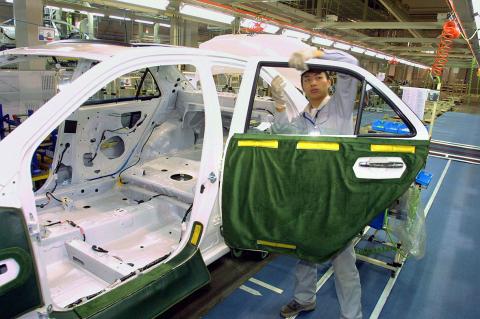Japanese auto giants Toyota and Nissan yesterday said they would cut production in China because demand for Japanese cars has been hit by the bitter diplomatic row over disputed islands.
The announcements came as talks between the countries’ foreign ministers on the sidelines of the UN General Assembly in New York ended without success.
“Our affiliates in China are adjusting production in consideration of demand,” a Toyota spokesman said. “There is an effect from the current situation between Japan and China on our sales.”

Photo: AFP
He was responding to a question about the impact of a festering row over the Diaoyutai Islands (釣魚台), called the Senkaku Islands in Japan, which are controlled by Japan, but claimed by Taiwan and China, which calls them the Diaoyu Archipelago.
A Nissan spokesman said plants run by its joint venture in China will suspend operations for slightly longer than the country’s early holiday period next month.
He said Dongfeng passenger vehicle factories would halt production from today to Oct. 7 “in the view of the current market situation, and since China’s national holiday will occur soon.”
“Production will restart on Oct. 8. After this, we will remain flexible regarding the market situation,” he said.
Toyota said production at its Tianjin FAW and Guanzhou-based GAC plants would be stopped until Saturday. The plants were already scheduled to close next week for the Chinese holiday.
Between them, the two plants represent the vast bulk of the manufacturer’s capacity in China, producing about 775,000 of the about 800,000 vehicles it makes.
The Sichuan FAW Toyota Motor’s (SFTM) plants in Chengdu and Changchun are to continue to operate, the company said.
An official at Honda, another Japanese automaker, who requested anonymity, said there had been a negative impact on the firm’s sales in China owing to the tensions.
During the meeting on Tuesday in New York, Chinese Foreign Minister Yang Jiechi (楊潔篪) accused Japan of committing a “gross violation” of China’s territorial integrity, according to Xinhua news agency.
Japanese Foreign Minister Koichiro Gemba said the atmosphere was intense in the talks, which lasted for about one hour.
Automakers were hit by shutdowns during sometimes-violent protests that rocked a number of Chinese cities after Japan nationalized three of the East China Sea islands on Sept. 11.
Japanese factories and businesses were shuttered amid fears they or their workers could be targeted by mobs.
The impact of the bitter row has already spilled over into other sectors, affecting trade between Asia’s two biggest economies.
Chinese and Japanese airlines said they would curb the number of flights linking Chinese and Japanese cities, while Japanese firms reported China was ramping up customs inspections for Japanese products at its ports.

Nvidia Corp CEO Jensen Huang (黃仁勳) today announced that his company has selected "Beitou Shilin" in Taipei for its new Taiwan office, called Nvidia Constellation, putting an end to months of speculation. Industry sources have said that the tech giant has been eyeing the Beitou Shilin Science Park as the site of its new overseas headquarters, and speculated that the new headquarters would be built on two plots of land designated as "T17" and "T18," which span 3.89 hectares in the park. "I think it's time for us to reveal one of the largest products we've ever built," Huang said near the

China yesterday announced anti-dumping duties as high as 74.9 percent on imports of polyoxymethylene (POM) copolymers, a type of engineering plastic, from Taiwan, the US, the EU and Japan. The Chinese Ministry of Commerce’s findings conclude a probe launched in May last year, shortly after the US sharply increased tariffs on Chinese electric vehicles, computer chips and other imports. POM copolymers can partially replace metals such as copper and zinc, and have various applications, including in auto parts, electronics and medical equipment, the Chinese ministry has said. In January, it said initial investigations had determined that dumping was taking place, and implemented preliminary

Intel Corp yesterday reinforced its determination to strengthen its partnerships with Taiwan’s ecosystem partners including original-electronic-manufacturing (OEM) companies such as Hon Hai Precision Industry Co (鴻海精密) and chipmaker United Microelectronics Corp (UMC, 聯電). “Tonight marks a new beginning. We renew our new partnership with Taiwan ecosystem,” Intel new chief executive officer Tan Lip-bu (陳立武) said at a dinner with representatives from the company’s local partners, celebrating the 40th anniversary of the US chip giant’s presence in Taiwan. Tan took the reins at Intel six weeks ago aiming to reform the chipmaker and revive its past glory. This is the first time Tan

CUSTOMERS’ BURDEN: TSMC already has operations in the US and is a foundry, so any tariff increase would mostly affect US customers, not the company, the minister said Taiwanese manufacturers are “not afraid” of US tariffs, but are concerned about being affected more heavily than regional economic competitors Japan and South Korea, Minister of Economic Affairs J.W. Kuo (郭智輝) said. “Taiwan has many advantages that other countries do not have, the most notable of which is its semiconductor ecosystem,” Kuo said. The US “must rely on Taiwan” to boost its microchip manufacturing capacities, Kuo said in an interview ahead of his one-year anniversary in office tomorrow. Taiwan has submitted a position paper under Section 232 of the US Trade Expansion Act to explain the “complementary relationship” between Taiwan and the US